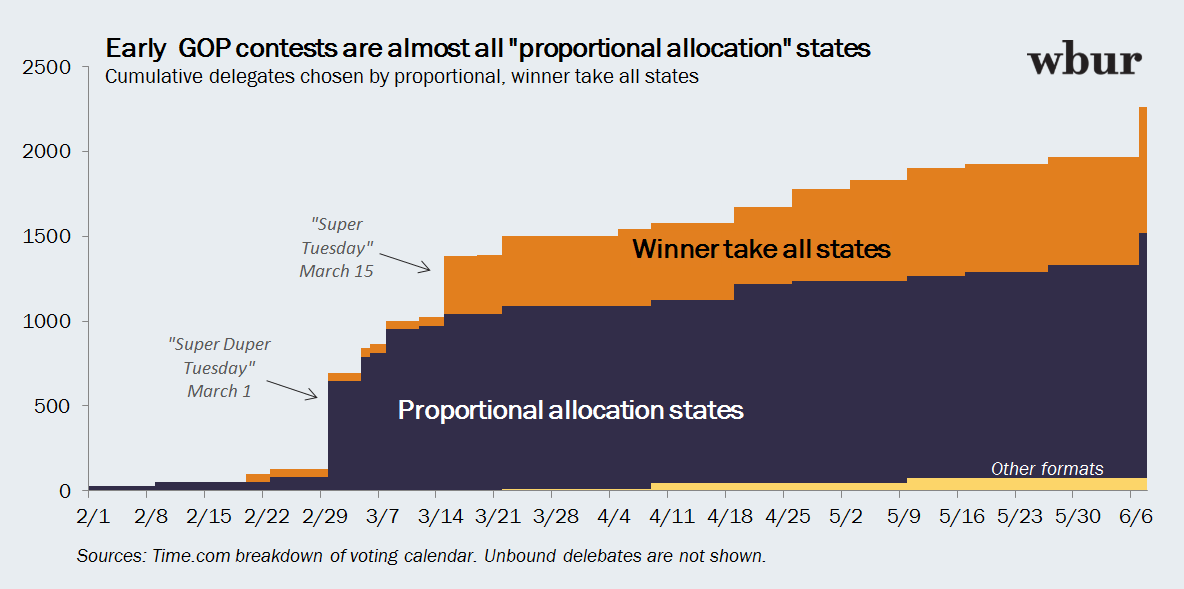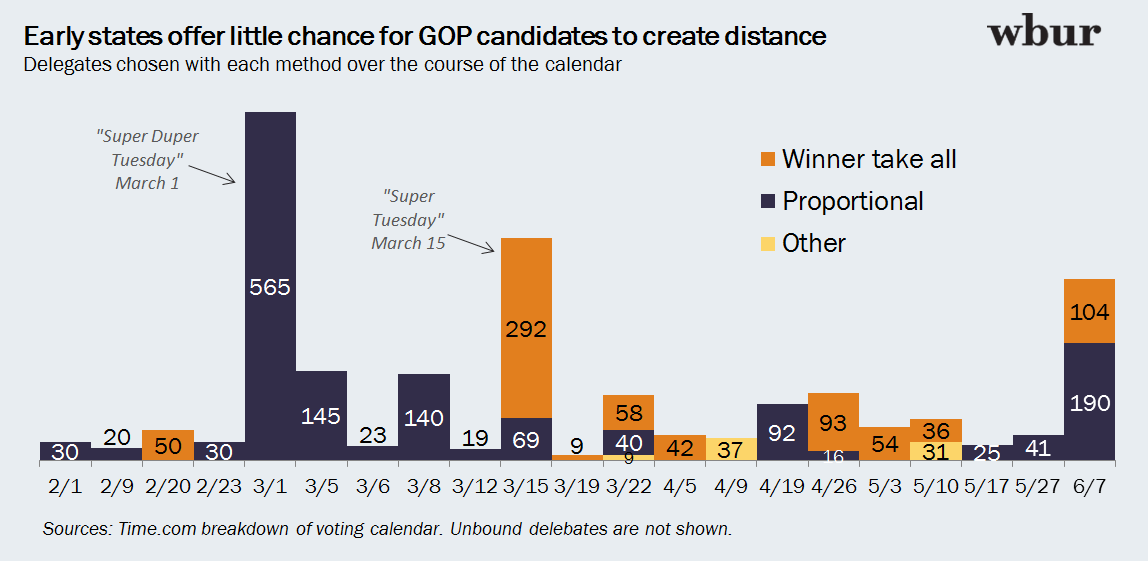Advertisement
Why The GOP Presidential Primary Could Extend Beyond Early States
For media outlets, pollsters and candidates, the focus in the Republican race for the White House has been on Iowa and New Hampshire.
Candidates especially have focused a huge amount of their attention on the first two states, according to the National Journal candidate travel tracker. Of the 883 trips by Republican presidential candidates over the last six months, 310 were to either Iowa or New Hampshire; another 122 were to South Carolina or Nevada, the third and fourth states to vote.
During their trips to New Hampshire, the candidates bounced around to 533 unique campaign stops, according to the database.
But more so than in past years, the GOP primary is set up as a marathon -- or at least a middle-distance race -- instead of a sprint. It’s distinctly possible the race will still be going strong for more than a month after the first two states cast their ballots in early February. Iowa voters head to the caucuses on Feb. 1, and New Hampshire voters eight days later.
Candidates left standing on March 1 will be within easy striking distance of the front-runners, because of the rules the Republican National Committee has adopted for 2016.
For the first month and a half of the primaries (Feb. 1-March 14), all but one of the states voting will award their delegates “proportionally.” This means (roughly), if Candidate A wins 30 percent of the total, he or she receives 30 percent of the delegates. Just under half the states will have voted by the time this period ends, awarding 43 percent of all the delegates at stake in the nomination process.

Awarding delegates proportionally across a large GOP field such as exists now renders it virtually impossible for any one candidate to build a big lead early on. Even if a candidate wins every one of these early states by 10 points, he or she would only be ahead by roughly 140 bound delegates, a small gap easily closed when the campaign moves to the next phase.
Going to proportional allocation flies in the face of other changes the RNC has made this year to streamline the nominating process. The party is holding fewer debates, each with more stringent criteria for admitting candidates to the main stage. All this was done to avoid a repeat of 2012, in which a series of lesser candidates was given significant airtime and a debate seemed take place every 10 or 15 minutes. RNC Chairman Reince Priebus compared the process last cycle to “a dog and pony show.”
Allocating early delegates proportionally instead of just to the winner of a state would seem to run against the stated goal by drawing out the contest. Ironically, this inconsistency may end up playing out in the establishment’s favor. Assuming outsider candidates Donald Trump and Ben Carson continue to occupy the top tier of the field, the new rules may offer establishment candidates more time to catch up.
Advertisement
By comparison, the Democrats allocate all of their delegates proportionally. At this point, the specifics of the Democratic contest appear unlikely to make a difference, since Hillary Clinton is polling far ahead everywhere but New Hampshire.
Proportional allocation won’t be enough to save floundering campaigns bumping along in the low single digits. GOP candidates who win few or no delegates in the early going likely won’t be able to maintain the funding necessary to keep up with the pace of primaries as the schedule moves ahead. But candidates who make respectable showings through the early part of March will have every incentive to stay in the race. That’s because a modest delegate deficit could easily be made up when winner-take-all starts voting on March 15. Suddenly, winning a state, even by a single vote, garners a windfall of delegates. On March 15 alone, 292 delegates in five contests will go to the winner of each state (and some congressional districts), no matter how small the margin. The biggest prize on that Super Tuesday is Florida, home of both Jeb Bush and Marco Rubio.
The strategy for Rubio, Bush and others hoping to catch Trump and Carson is to keep things close in the early states, where everyone can win delegates, and hope to make up the differences in winner-take-all showdowns on March 15 and afterward. The risk is as big as the reward; lose each contest even by a tiny margin, and a candidate walks away with nothing to show for it. And after March 15, many of the proportional states have thresholds, where candidates have to win 10 to 20 percent of the vote to gain any delegates.

If the race is not over after Super Tuesday, the rest of March and April should sort it out quickly. A set of winner-take-all states should allow even a narrow front-runner to vault to a massive and permanent lead. Unless the field is down to two candidates each winning some states, it is hard to see how the contest would last through April.
The only hope for lower-tier candidates would be if no candidate has enough delegates to secure the nomination outright. That could trigger the politico’s dream: a brokered convention, where the nominee is decided at the GOP gathering in Cleveland. In that scenario, candidates bringing handfuls of delegates from proportional states could hold valuable leverage.
Of course, first the campaigns need to get through Iowa and New Hampshire with respectable showings, if not for the delegate hauls then to keep donors and supporters on board and the media at bay. The same goes for South Carolina and Nevada. Unless one candidate runs the table and wins all four of the early states, proportional allocation early means the odds are good of a drawn-out contest. Candidates may be racking up the miles traveling to these four states now, but they should start thinking about branching out.
Steve Koczela is president of the MassINC Polling Group and a regular contributor to WBUR Politicker. Follow him on Twitter @skoczela.